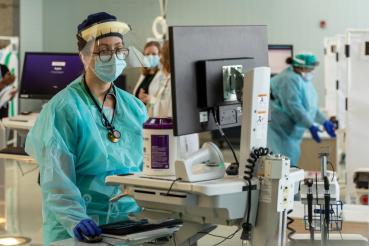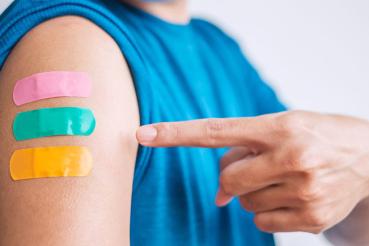Amid the recent surge in COVID-19 cases, Paul Casey, MD, answered questions about the Delta variant, vaccine boosters and the likelihood of vaccinations for children under 12. Here's a transcript:
What are the recent trends with COVID? What are the numbers look like, especially in light of this Delta surge?
I think it's a mixed story at present, depending on where you live in the country, is the honest answer to that. But overall, when we look at it throughout the United States, the good news is, that we're starting to see less daily reported cases over the past week or so than we had been really at about a month or so ago at the height of the Delta surge. Now, certainly we know that the Delta has been more contagious. And so, it has been spreading since about mid-July and soon thereafter became the predominant strain within the United States. So, we're encouraged to starting to see these numbers going down while there are still some states such as Alaska that the spread continues and the cases are on the rise.
What do we know about the Delta variant in terms of driving up case number in states with low vaccination rates and how concerned should we be in the Chicago area?
So, there is absolutely a relationship between the areas with higher vaccination rates and less new cases. And then conversely, areas that have lower vaccination rates where we're still seeing them as "hotspots areas" with continued report of cases. And we're fortunate in the Chicago area to have a relatively high vaccination rate at this point. So, we haven't quite seen the same number of cases in the Chicago area as other parts of the country. The parts of the country that have been most impacted as you've seen have really been the Southeast of the United States as well as some of the states in the west. And as I mentioned a minute ago, Alaska as well. So I think at this point, there is no question about the efficacy of the vaccine and really Delta has told that story well, that those areas that are vaccinated, once we hit that critical mass of vaccination, we just do not see the same rising cases.
How effective are these vaccines against the Delta variant?
So, to put things into perspective, speaking specifically about the Pfizer and the Moderna, those mRNA vaccines, their efficacy has been outstanding from the start, around 92%, 93% effective. Now, that of course, means that it's still possible to get coronavirus, get the virus after being vaccinated, but it's not likely to land you in the hospital. And certainly not nearly as likely to die from the coronavirus after vaccination. And we've seen with the Delta virus that really they're only mildly less effective against the Delta strain as compared to the strange that proceeded the Delta. So, from 92 to 93% down to around 88, 89%. To put that again in perspective, often, most years prior to this, the flu vaccine, we were quite happy when the flu vaccine was 70 to 80% effective. That was a pretty good year in terms of containing the flu. So, really the vaccines are highly effective even against the Delta strain, which is great news for all of us.
Who needs COVID-19 booster shots?
So, we know back earlier in the month, there was a third authorization. The CDC had authorized a third dose of the vaccine for those that were immune-compromised. So those are people that have underlying medical conditions, either they're on medications to suppress their immune system or the condition itself is immune-suppressing. So third doses were authorized for that group of people earlier in the month. And that's again to boost that immune response and get those antibody rates to a protective level in that group.
Now, more recently, just as of last Friday, there were booster shots that were also recommended. And the booster shots are for a few key groups that they have recommended these groups should get the booster. And that's individuals that are over 65, as well as those that are 50 to 64 with underlying medical conditions that put them at a higher risk. And then anyone that has an occupational exposure that puts them at a higher risk. So certainly healthcare workers, teachers, other individuals that have the possibility of being exposed to coronavirus, those occupations. There's also a recommendation to get the booster. So at this point, that's really the groups that are focused.
The other piece to keep in mind is that we've only had authorization at this point for the Pfizer booster. We anticipate that Moderna and Johnson & Johnson, we'll hear more about in the weeks ahead. But at this point if your first vaccination series was with the Pfizer, and it's been six months since your second shot and you fall within these groups, that's the group that we really, the booster's recommended for. Again, we anticipate Moderna and Johnson & Johnson that will be in the next few weeks. We'll hear more about that. And certainly most of the talk at this point has been about the Pfizer vaccine. So I think, again, it's really the authorization from the CDC that paces this out. So, we're going to hear more regarding the Moderna vaccine in the next two or three weeks, we'll get that guidance.
When does it seems like the vaccine will be available for younger kids?
I can tell you having a young kids myself, this is news that we've been eagerly awaiting is those five to 11. And we know that those trials are now complete, and we anticipate that that data is going to be sent to the FDA and then to the CDC within the next few days. So, really that's a very hopeful sign for those of us that have young ones that are going to school and other places as well. So we are hopeful that by Halloween, we'll have more news in terms of the authorization and hopefully beginning to get shot in our arms by early November, before November, December. So, more to come on that as well.
Can we socialize with friends and family if we're vaccinated?
It's okay to socialize once you're vaccinated with family and friends. And the recommendations around this are still, certainly it's safer for vaccinated individuals to congregate with other vaccinated individuals. The risk of spread of coronavirus in those settings is quite low compared to unvaccinated individuals getting together. The other guidance around this is certainly that outdoor continues to be safer than indoor, just in general, whether vaccinated or unvaccinated. So, hanging out outdoor where there's better air flow circulation. So, that would be the recommendation that it's okay once you're vaccinated hanging out with immediate family, close friends that you're really in contact with that are also vaccinated, but the more we can promote any air circulation, the better in any of those settings.
Are there other variants that people need to know about?
We keep hearing about new variants that are coming up. And of course, most recently the coverage has been entirely about the Delta area. I think the important message here is that every new case of coronavirus gives the virus an opportunity to have a genetic mutation and potentially spawn a new variant. So, the one way that we can together decrease the risk of new variants is really to prevent any new cases. And that's goes back to the things that we've been doing over the past year, masking, distancing. And certainly now as we talked about vaccination is really, probably one of the most important pieces of that to prevent the spread.
There are some new variants of concern that have been identified. One, and you may hear about as the new vaccine that would, or excuse me, the mu variant, it's still too early to know a whole lot about how that spreads and the efficacy of vaccines. And we haven't seen many cases here locally or in the United States at this point with that specific variant. But it's also important to keep in mind that this is really a global effort. In a time where people travel freely around the world, it's really important, not just that we get vaccinated with amongst our families, our communities, our cities and as a country, but also help promote the vaccination across the world to really decrease coronavirus cases and that disease burden throughout the world.
Why do people who have had COVID need to get vaccinated?
What we know is that like with other viruses, that when you have COVID, you do get an immune response and some antibody response, but we don't know for how long that lasts and how protective it is. It's likely protective for a much shorter period than the vaccine itself, which is really engineered to create this robust immune response and make sure that you're generating enough antibodies to be protective against future cases of coronavirus. So, it's still recommended that after you've had coronavirus, even if you've had coronavirus that you do get the vaccination a period after having the coronavirus or recovering from the coronavirus itself.
Will Rush be opening a vaccine clinic again for boosters?
That's a great question. And we absolutely plan to have the vaccine available for both our patients and our staff as well as the community. I think one key difference this time around is how readily available the vaccine is. When we look back, just months, well, really it's about eight, nine months ago when we started vaccinating, one could only get the vaccine really from large hospitals that had the availability and were getting the vaccine. It's now fairly broadly available at retail pharmacies as well. So, we want people to go where it's most convenient for them. We certainly don't want them waiting to get their initial series, certainly and the booster to come, we don't want them having to wait for it.
So, really the message there is whatever's most convenient, if it's a local pharmacy or here at Rush, we're happy to help take care of you. And I think that is all the questions that we had come in today. So hopefully this has been informative. Again, please keep the conversation going, please continue to encourage your friends, family. You're truly the trusted voices around this and the more that we can carry forward the same message about the efficacy of the vaccine and how important that is, I think that's really critical for our success and coming out of the pandemic. So, thanks again for taking the time today.




